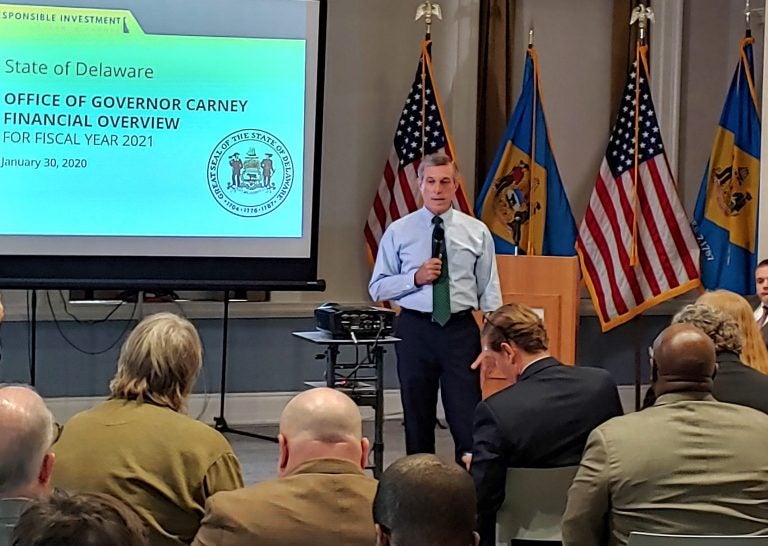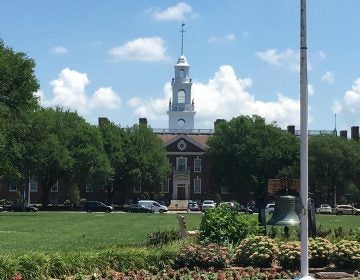Big on improving infrastructure, Carney makes $4.6 billion Delaware budget proposal
Flush with revenue, Delaware Gov. John Carney presents a spending plan to lawmakers that increases the budget by 4% over the current year.

Gov. John Carney presents his $4.6 billion spending plan to state lawmakers in Dover Thursday morning. (Zoë Read/WHYY)
It’s a year of plenty in Delaware state coffers.
In December, the state added $121 million to the amount of revenue expected for the current fiscal year which ends June 30, 2020. The Delaware Economic and Financial Advisory Council also increased its revenue forecast for the next fiscal year by $82 million.
On Thursday morning, Gov. John Carney told members of the General Assembly how he’d like to spend $4.6 billion in his annual budget address in Dover.
“When you have a strong and growing economy, it makes it easier to put together a budget,” Carney said.
Despite being flush with cash, Carney again stressed the importance of squirreling away millions of dollars to better prepare the state for when revenue is lean.
“We all ought to be smart about this budget though, and think about setting ourselves up appropriately for the future,” he said.
Even though his FY 2021 budget is 3.99% above the 2020 spending plan, it still appropriates less than the 98% of expected revenue the state is legally allowed to spend. Under the proposal, $233 million of one-time funding will be allocated to the capital budget to fund infrastructure projects. Another $161.5 million will be set aside in a reserve account in addition to the rainy day fund, which holds about 5% of the state’s projected revenue.
“Use it as an opportunity to make investments in our economic infrastructure — in higher education, in public education, to take our state to the next level — but to be smart about not going too far so that we set ourselves up for a more difficult time in the future.”
House Minority Leader Rep. Danny Short, a Republican, said the budget looks good on the surface.
“We’ve been having good communication with the governor about this budget,” he said.
Republicans are especially supportive of the effort to save money now for a downturn in the economy in the future.
“That’s a big deal. It’s what we do in business every day, to try to save for that day when the money kind of gets a little bit slack and you have to fill that void,” Short said.
But all the extra money is not just going to savings. Earlier this month, Carney announced two major spending initiatives, a $50 million plan to build the first new school in Wilmington in decades and another $50 million to establish the Clean Water Trust Fund and improve water quality in the state.
“It also gives us a very unique and historic opportunity to make investments in clean water, in school construction,” Carney said.
Lawmakers from southern Delaware may push back against spending money specifically to help Wilmington schools.
“The kids … have the same demographic in the south as they do in the city,” said Short, who represents the Seaford area in southern Sussex County. He questioned “the fairness issue, the equity issue on that.”
Democratic state Sen. Harris McDowell had high praise for Carney’s plan.
“The governor has given us a really excellent, well-grounded road map to follow,” said McDowell, who represents the northern Wilmington area. “If he’s putting more money in the poverty schools that are concentrated a little bit in Wilmington, that’s because there’s a need there.”
He said helping kids in Wilmington do better will pay off when those kids are successful a generation from now.
The budget also includes a 2% pay raise for state employees for the third year in a row. It calls for fully funding both the farmland and open space preservation programs at $10 million each.
The capital budget, which funds infrastructure projects, would get $893 million to fund projects including $17.5 million to construct new facilities for Kent and Sussex County Family Court. New security cameras would be installed at the state prisons with $4 million in funding. Another $184 million would fund school construction and renovations statewide, with $30 million going to building improvements at the state’s colleges and universities.
Between now and March, members of the Joint Finance Committee will hold hearings on the budget and get input from state agencies and advocates. The committee will propose changes to the spending plan in April and May. State lawmakers are required to have a budget approved by the end of the legislative session on June 30.
WHYY is your source for fact-based, in-depth journalism and information. As a nonprofit organization, we rely on financial support from readers like you. Please give today.




